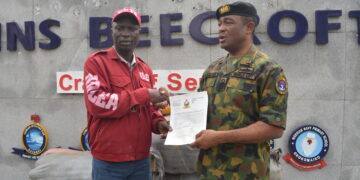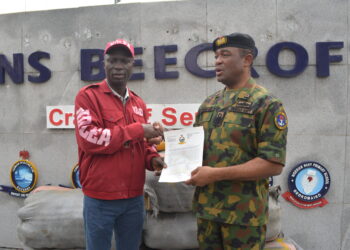The Nigeria Customs Service (NCS) has
expressed its resolve to continue to scrutinize the various processes for
fraudulent intent, in the course of duty while facilitating trade.
expressed its resolve to continue to scrutinize the various processes for
fraudulent intent, in the course of duty while facilitating trade.
Deputy Controller of Customs Dera Nnadi, who is in charge of
enforcement and compliance at the Tin-Can Island Command of the Customs, stated
this in an interview during a focus group meeting convened by the Nigerian
Chamber of Shipping in Lagos on Tuesday.
He said much emphasis had been laid on
regulation, compliance and further checks to stop unscrupulous acts that could
hurt the economy and national security.
regulation, compliance and further checks to stop unscrupulous acts that could
hurt the economy and national security.
He said: “A 21st century customs
officer would prefer to give priority to trade facilitation, but then, how do
you do that in an environment where supply chain integrity is very poor, and
you need to enforce compliance.
officer would prefer to give priority to trade facilitation, but then, how do
you do that in an environment where supply chain integrity is very poor, and
you need to enforce compliance.
“Even when you try to facilitate trade,
again, how do you also marry trade facilitation against national security?
These are emerging key issues and some of the reasons for the amendment of our
law.”
again, how do you also marry trade facilitation against national security?
These are emerging key issues and some of the reasons for the amendment of our
law.”
Earlier in his presentation, Nnadi had told
the gathering that the NCS simply works within its function of implementing
trade policies as has been set, and not the making of policies.
the gathering that the NCS simply works within its function of implementing
trade policies as has been set, and not the making of policies.
He had spoken in that direction explaining
to stakeholders who lament the huge duty payment on importation of vessels,
while it is zero duty on importation of aircraft.
to stakeholders who lament the huge duty payment on importation of vessels,
while it is zero duty on importation of aircraft.
“What we do as customs is to take feedback
from people like you and send it to management, so that management would pass
it to the relevant government agency, this time around, the ministry of
finance.
from people like you and send it to management, so that management would pass
it to the relevant government agency, this time around, the ministry of
finance.
“We take whatever policy that government
comes up with, interpret and share with you. What we do with the policies is to
implement them, because of the mandate that we have,” Nnadi said.
comes up with, interpret and share with you. What we do with the policies is to
implement them, because of the mandate that we have,” Nnadi said.
He, however, called attention that agencies
of government, particularly in the maritime industry, should focus on their primary
regulatory functions rather than emphasizing on revenue collection, one of the
core functions of the customs service.
of government, particularly in the maritime industry, should focus on their primary
regulatory functions rather than emphasizing on revenue collection, one of the
core functions of the customs service.
His words: “If we are going to emphasize on
revenue, we can identify government agencies that are mainly concerned with
revenue, like customs, and ask them to deal with revenue.
revenue, we can identify government agencies that are mainly concerned with
revenue, like customs, and ask them to deal with revenue.
“We see that many agencies, particularly in
maritime abandon their regulatory functions for revenue, making operators to be
overtaxed and when they are overtaxed they circumvent the processes.”
maritime abandon their regulatory functions for revenue, making operators to be
overtaxed and when they are overtaxed they circumvent the processes.”
He added that following pressures from
double taxation, people try to wiggle their way out by cheating, and then make enforcement
and compliance a challenge.
double taxation, people try to wiggle their way out by cheating, and then make enforcement
and compliance a challenge.

































































